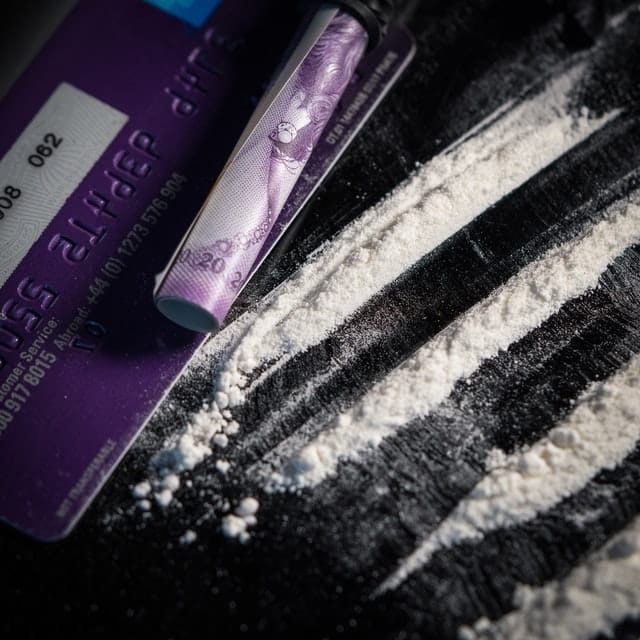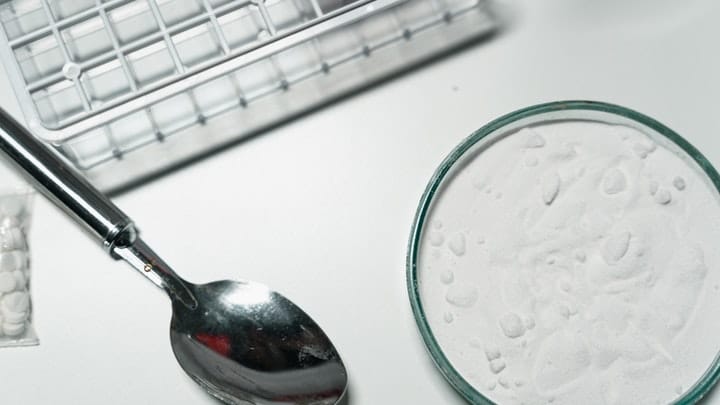Cocaine addiction can have a devastating impact on your body, relationships and finances, but most of the damage happens in your brain.
Using cocaine can put you at risk of various neurological disorders and can even physically change the way your brain works, making it even more difficult to stop using this drug.
This article explores the neurobiology of cocaine addiction, examining why this substance has such a damaging effect on the brain and how to recover from it against all odds.

Cocaine is an illegal stimulant drug that is made from the crushed leaves of the coca plant.
It is usually sold in the form of a fine white powder, which dealers often mix with other substances such as flour or talcum powder.
In some cases, cocaine is combined with other illegal or dangerous substances in order to bulk it out.
This means you won’t know exactly what you’re taking, [1] which has led to overdose in many cases.
Most people who use cocaine will snort it, however it can also be rubbed on the gums or injected into the bloodstream. Some people inject a combination of cocaine and heroin, known as a speedball.
As well as powder form, cocaine is also made in rock form. This is known as crack cocaine and is a more potent form of the drug.
It is heated and smoked to produce a high.
People who use cocaine report feeling extremely energetic and euphoric.
They often feel more confident after using this drug, which is why it is widely used on the party and clubbing scenes in the UK.
Cocaine is a short-acting drug, which means the effects will start very soon after taking it and then wear off quickly.
It usually lasts for up to an hour depending on how much the person has taken.

Cocaine is one of the most addictive substances in the world.
It is also the second most-used drug in England and Wales.
As well as being addictive, cocaine is highly dangerous.
There were 857 deaths in England and Wales involving cocaine in 2022, which is a 2% increase on the year before. [2]
Cocaine-related deaths have been increasing every year since 2011, and they show no signs of slowing down.
Despite this scary statistic, many people continue to use this drug simply because it is so addictive. In fact, so many people in the UK use cocaine that traces of it can be found in the water supply.

There are many factors involved in the neurobiology of cocaine addiction that can make it very difficult to stop using this drug, even if it is causing major problems in your life.
Cocaine interacts with the limbic system, which is the part of the brain that controls instinctive emotional and behavioural responses. [3] This includes motivation, memory and the fight or flight response.
The primary way it does this is through dopamine, a chemical released by the brain when we complete specific actions such as eating delicious food or getting a massage.
Dopamine makes us feel good, and releasing this chemical makes us more likely to repeat the action.
Only a relatively small amount of dopamine is released naturally, and it is then recycled back into the cell.
However, when someone takes cocaine, it binds to dopamine receptors in the brain and prevents dopamine from being released.
This leads to a large build-up of this chemical, and when it is eventually released the person will feel a huge rush of euphoria.
The amount of euphoria caused by cocaine use is impossible to replicate naturally, and it doesn’t last for very long.
As a result, the person may continue using cocaine in an attempt to feel the same rush of euphoria again. [4]
Cocaine can also cause physical changes to occur in the brain after repeated long-term use, making it even more difficult to stop using this substance.
In some cases, the brain will no longer release dopamine without the presence of cocaine, and this can last for months or even years after addiction treatment.

Due to the powerful nature of this drug, cocaine has many short-term effects on the brain.
These effects can occur whether you have been taking cocaine for years or are trying it for the first time.
As cocaine is often cut with other substances including dangerous drugs and chemicals, you are taking a risk every time you use it.
Some of the below effects will occur as soon as you use the drug, while others may take longer to develop or only occur if you continue to use cocaine multiple times in one sitting.
Short-term effects of cocaine on the brain:
In most cases, the short-term effects of cocaine on the brain only last for around an hour.
However, it is common for people to continue using cocaine in bursts throughout a 24-hour session to experience the effects for a longer amount of time.

Although cocaine is a fast-acting drug with short-term effects that only last for a short time, the use of this substance can have long-term effects on your brain.
Over time, your brain’s dopamine receptors can become dulled by the frequent use of cocaine.
This can result in the inability to feel pleasure naturally and a compulsion to continue using cocaine in order to feel that rush of euphoria.
Some people spend years chasing that initial dopamine hit, and this can develop into a full-blown addiction.
Using cocaine regularly over months or years can cause your brain to become more sensitive to some of the short-term effects of this drug.
Even if you take a smaller dose than usual, your brain will react as though it is a large dose resulting in extreme anxiety, paranoia and potential seizures.

Cocaine can damage your brain – people who use this drug are at an increased risk of neurological disorders such as Parkinson’s disease. They are also more likely to suffer from a brain aneurysm, haemorrhage or stroke.
Some of these effects can be reversed with proper treatment and medical care, but others may be permanent and even fatal.
Using cocaine can increase your chances of developing a mental health disorder such as anxiety or depression.
Your personality and behaviours can also change, with some people becoming more irritable and agitated.
It’s also possible to develop psychosis due to cocaine use.
Although cocaine is often used to reduce stress and self-consciousness in social situations, over time it can actually cause your brain’s stress receptors to become more sensitive.
Your brain may start reacting to relatively low-stress situations as though they are extremely stressful, and this can be a very difficult neurological side effect to overcome.

Anyone can develop a cocaine addiction regardless of age, gender or income. However, there are some factors that make certain people more likely to become addicted to this drug.
Of course, the act of using cocaine is a prerequisite to developing an addiction, and the more one uses cocaine the more likely this becomes.
It is such a powerful drug that just one use can kickstart a dependency, particularly if you continue chasing that original rush of euphoria with more frequent cocaine use. [5]
Genetics account for around 50% of addiction, and studies have shown that having a close family member with a history of substance misuse can make it more likely that you will develop an addiction. [6]
This also goes hand-in-hand with the environment you grow up in – if the people around you are frequently using cocaine or other drugs, this behaviour will become normalised and you will likely have easy access to these substances.
Cocaine is known for its confidence-boosting effects, and many people are drawn to this drug as it can help them feel more sociable and confident in social settings.
As a result, those with low self-esteem are more susceptible to developing a cocaine addiction as they may become dependent on these effects and feel unable to function socially without this drug.

Many people cope with stress by using drugs like cocaine, as it gives them a temporary respite from the struggles of their daily lives.
If you have a high-pressure job, financial troubles or other issues in your personal life, you are at greater risk of developing a cocaine addiction.
It’s fairly common for people with mental health disorders such as anxiety, depression, bipolar disorder and schizophrenia to cope with their symptoms by using drugs.
Cocaine can provide a boost of energy and temporary feelings of happiness, so it can be very alluring for people who are struggling to cope and want to numb their symptoms.

As cocaine is so addictive, it can be extremely difficult to stop taking it without professional help.
The most effective way to recover from cocaine addiction is to seek help at a rehab clinic, either as an inpatient or an outpatient depending on your needs and budget.
We recommend finding a rehab that specialises in treating cocaine addiction.
The first phase of rehab for cocaine addiction is a detox, where a team of trained medical professionals will help you stop taking cocaine.
This may be cold turkey, where you completely stop taking the drug straight away, or you may be placed on a detox programme that slowly reduces the amount of cocaine you are taking over 7-10 days.
As we mentioned earlier in this article, most people will experience withdrawal symptoms during this time.
You will be closely monitored throughout the process to ensure your safety, and you will not have access to cocaine or any other addictive substances during this time to prevent a relapse.

Most rehab programmes include at least three weeks’ worth of counselling sessions, which take place after the detox phase.
You will be matched with a trained therapist who specialises in treating addiction. If you don’t like your therapist, you will usually have the option to switch to a new one.
Counselling is a safe place where you can express how you feel.
You can talk about anything you want – a traumatic event that occurred in your past, an unhappy childhood, a difficult breakup, etc.
Many of these issues can contribute to cocaine addiction, and you may be surprised at how much talking can help.
Your counsellor will also help you to develop coping skills to deal with cravings and difficult emotions, which will be extremely helpful after you leave rehab.

Your recovery doesn’t end once you complete a rehab programme.
Cocaine is a powerfully addictive drug, and many people struggle with cravings for weeks or even months after treatment.
It is recommended that you secure some form of counselling after rehab, either private or NHS-funded.
This can provide an outlet for your feelings and emotions during recovery and help you to learn healthy coping skills.
Support groups can also be a very effective way to maintain your recovery and avoid relapse after going through cocaine rehab. They are free to attend, meet regularly and allow you to form a community of people who understand what you’re going through.
Cocaine Anonymous [7] and Narcotics Anonymous [8] are available throughout the UK and welcome anyone who needs support.

It is possible to recover from a cocaine addiction, no matter how long you have been struggling.
While this drug can have a devastating effect on your brain, a lot of this damage can be reversed with the right treatment.
Call Rehab 4 Addiction today on 0800 140 4690 and take your first step towards recovery.
Our free service puts you in touch with a rehab clinic that suits your lifestyle and budget, and our team are happy to support and guide you along the way.
[1] https://www.nj.gov/humanservices/dmhas/publications/miscl/NIH_NIDA/Cocaine.pdf
[3] https://www.ncbi.nlm.nih.gov/pmc/articles/PMC5816031/
[4] https://nida.nih.gov/research-topics/cocaine
[5] https://pubmed.ncbi.nlm.nih.gov/18552739/
[6] https://www.ncbi.nlm.nih.gov/pmc/articles/PMC3506170/